Charles E W Bean, Diaries, AWM38 3DRL 606/268/1 - 1917 - 1936 - Part 5
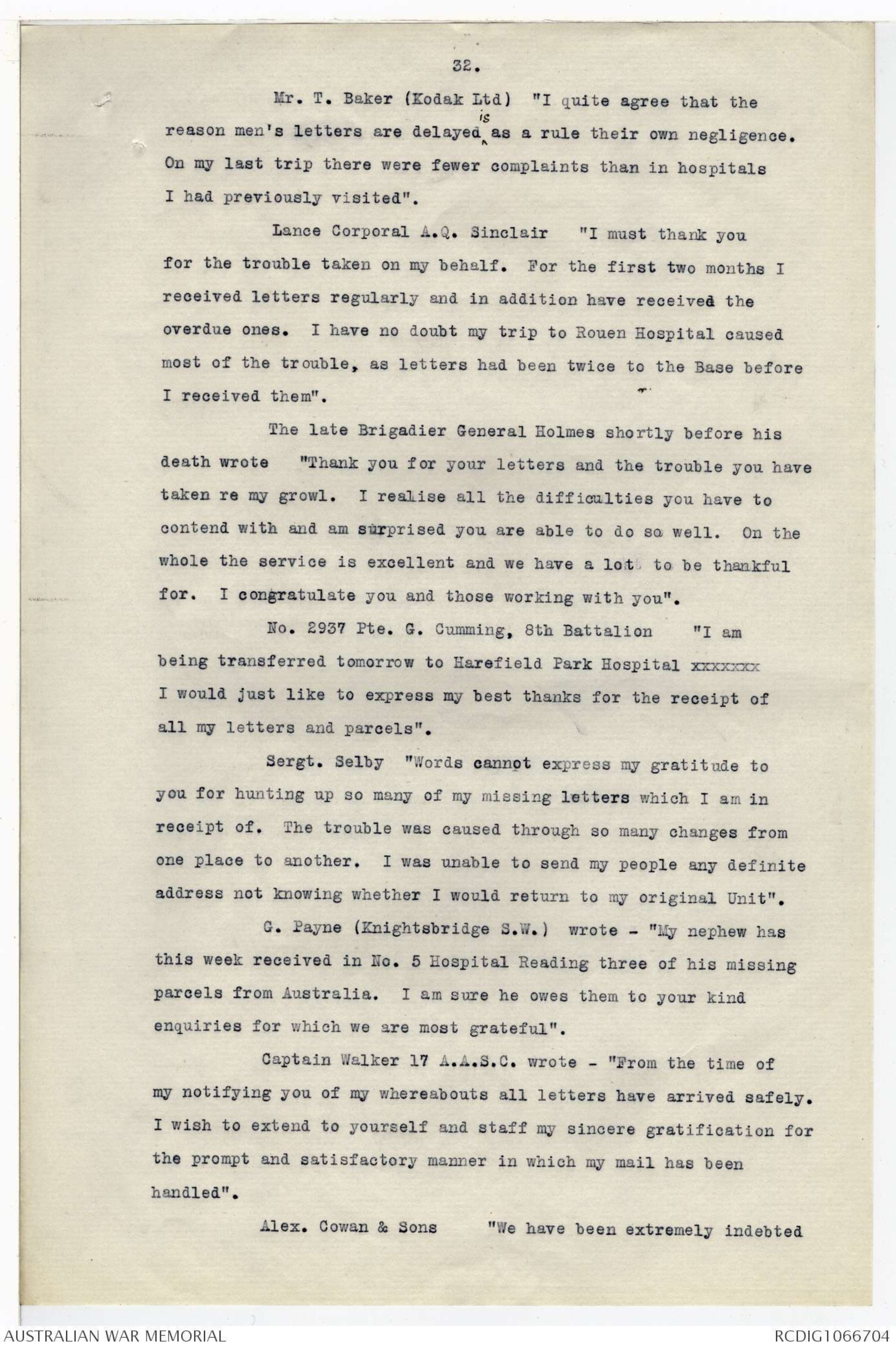
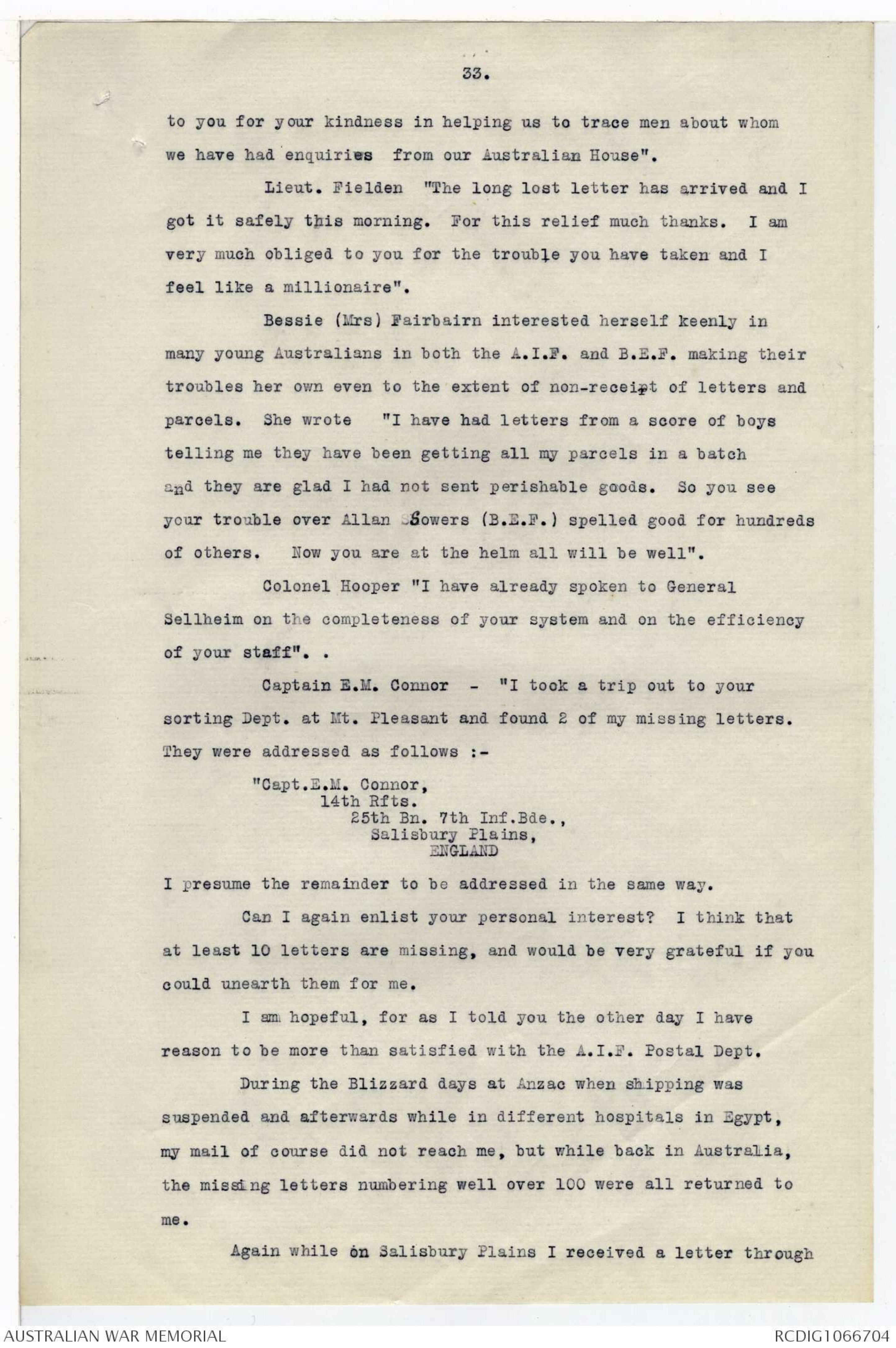
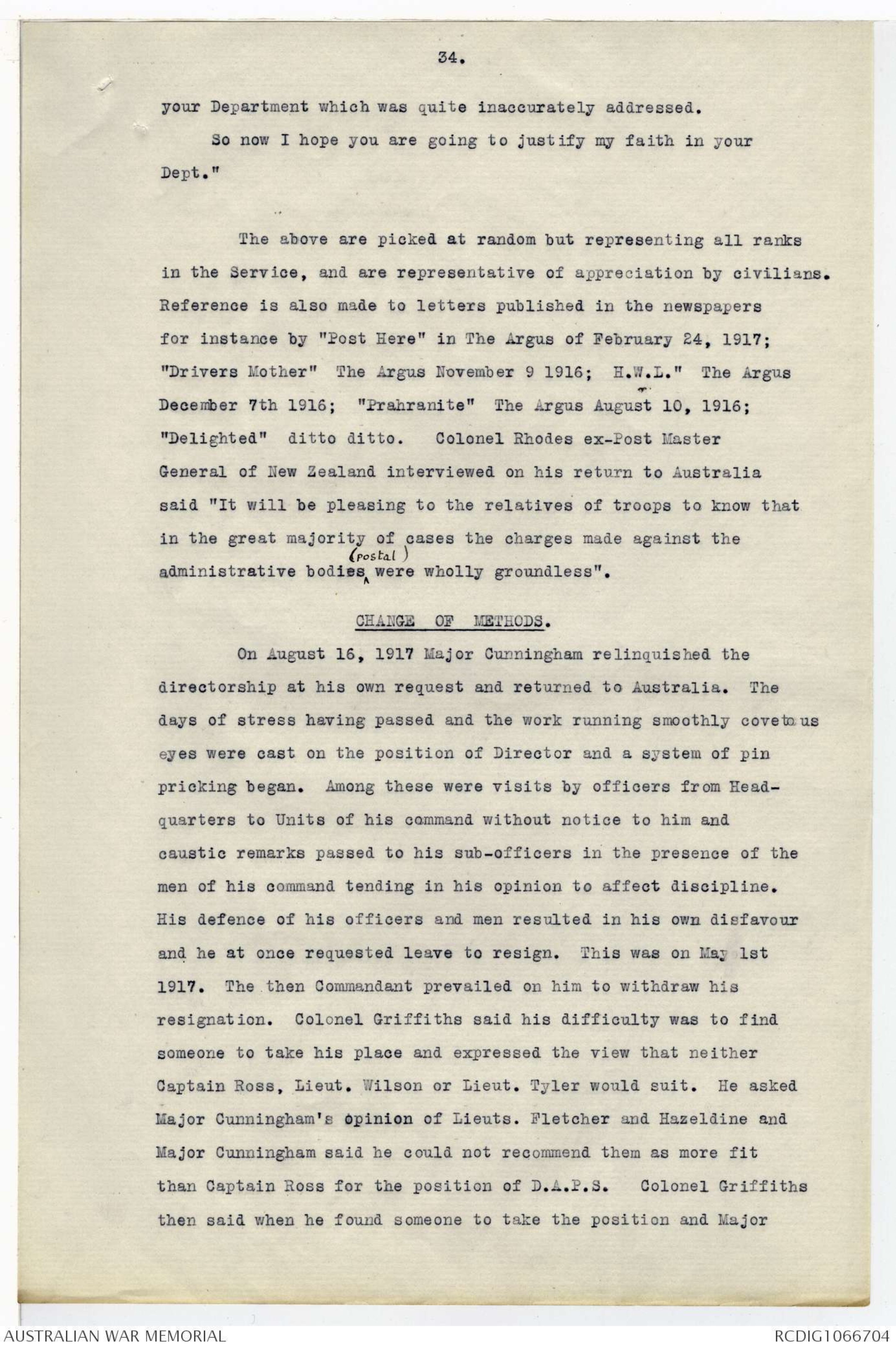
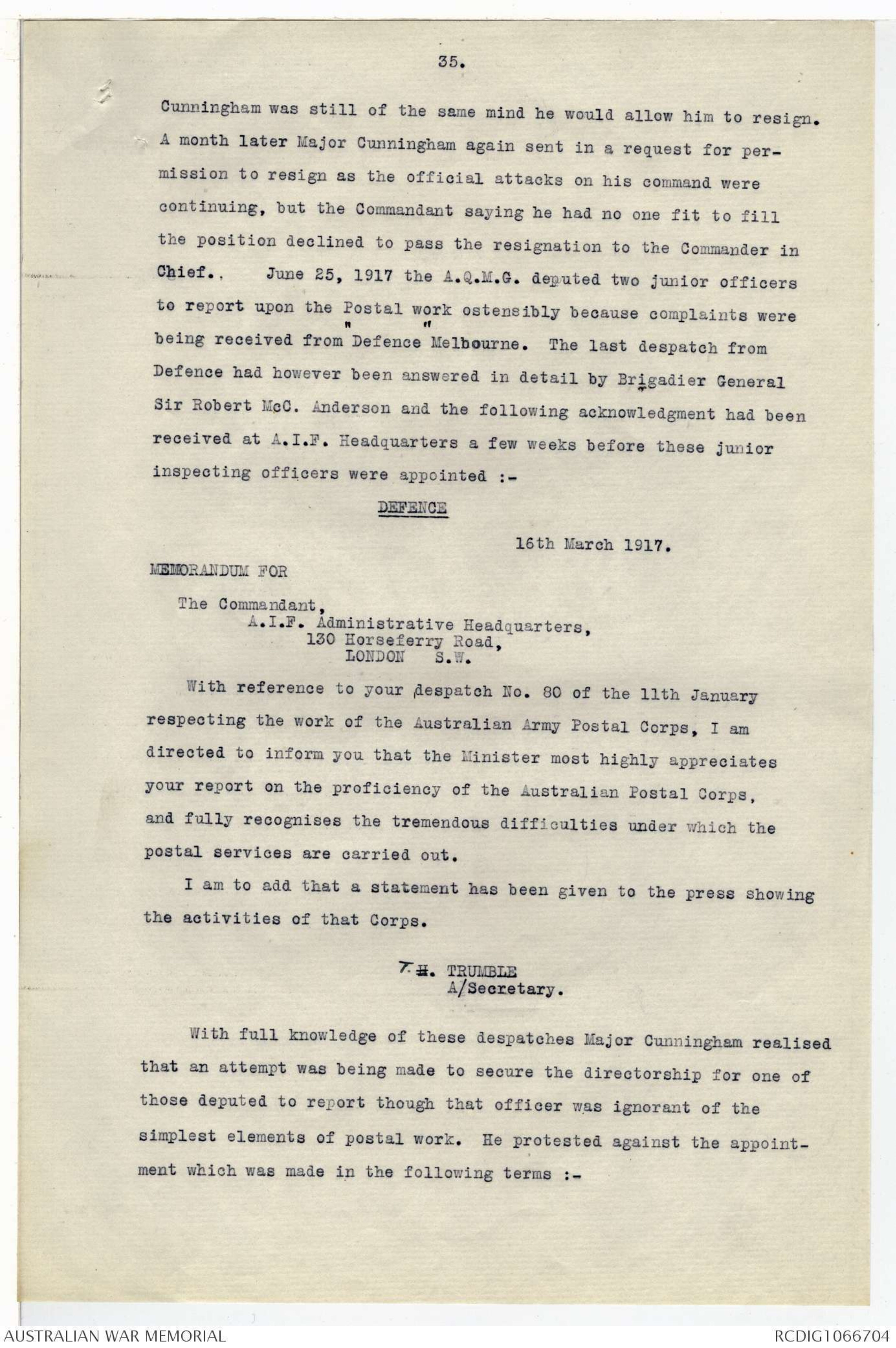
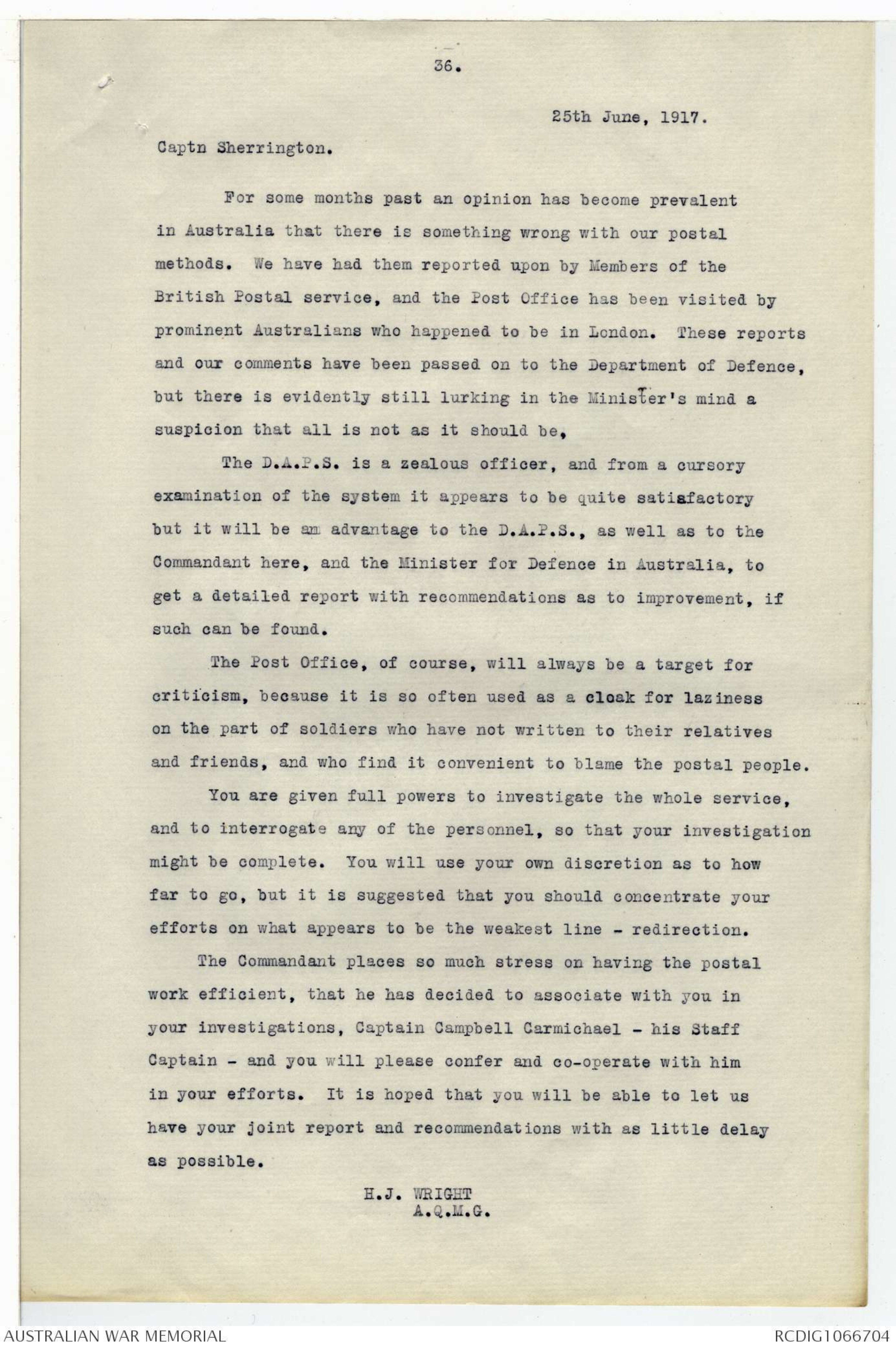
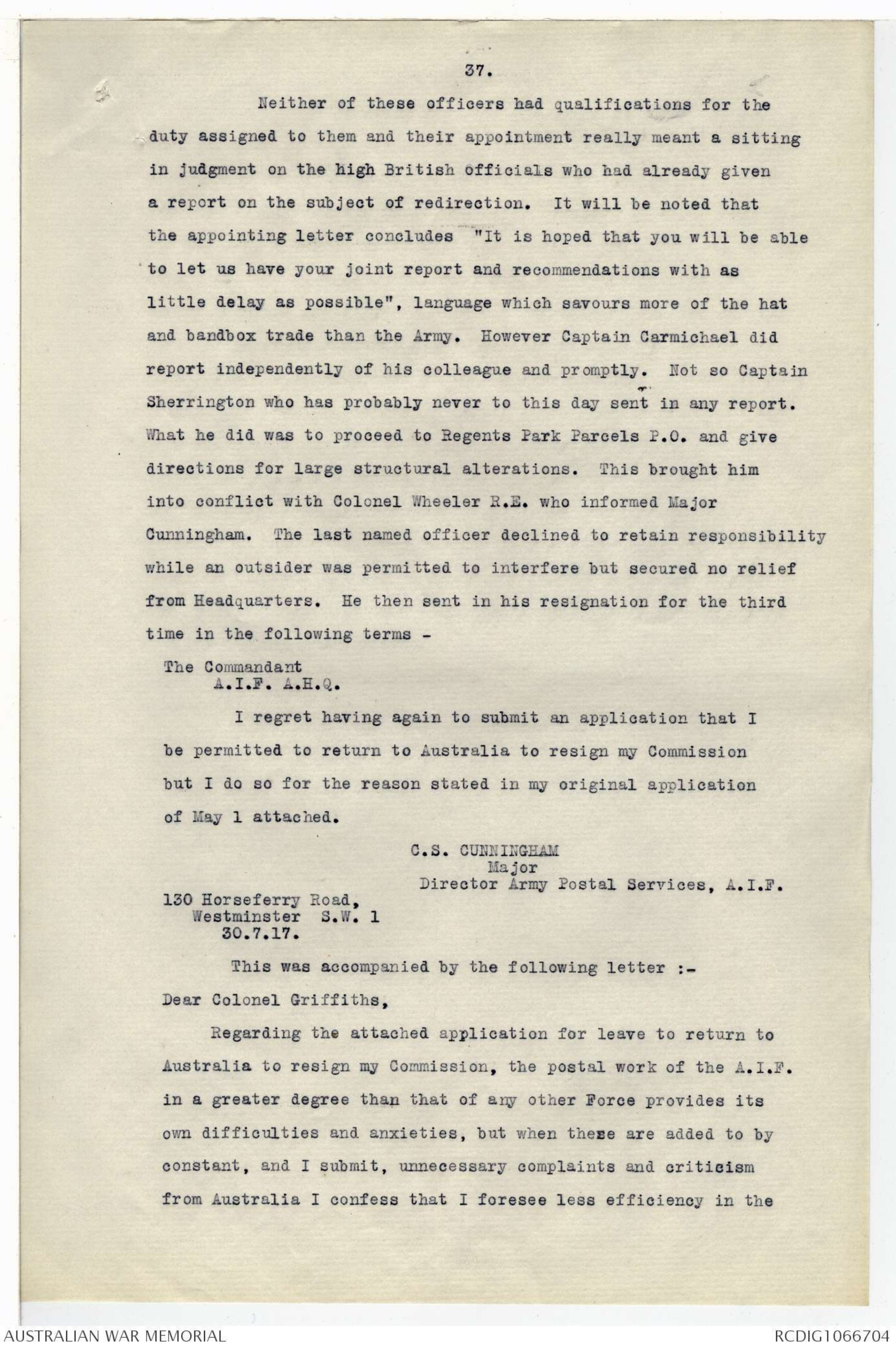
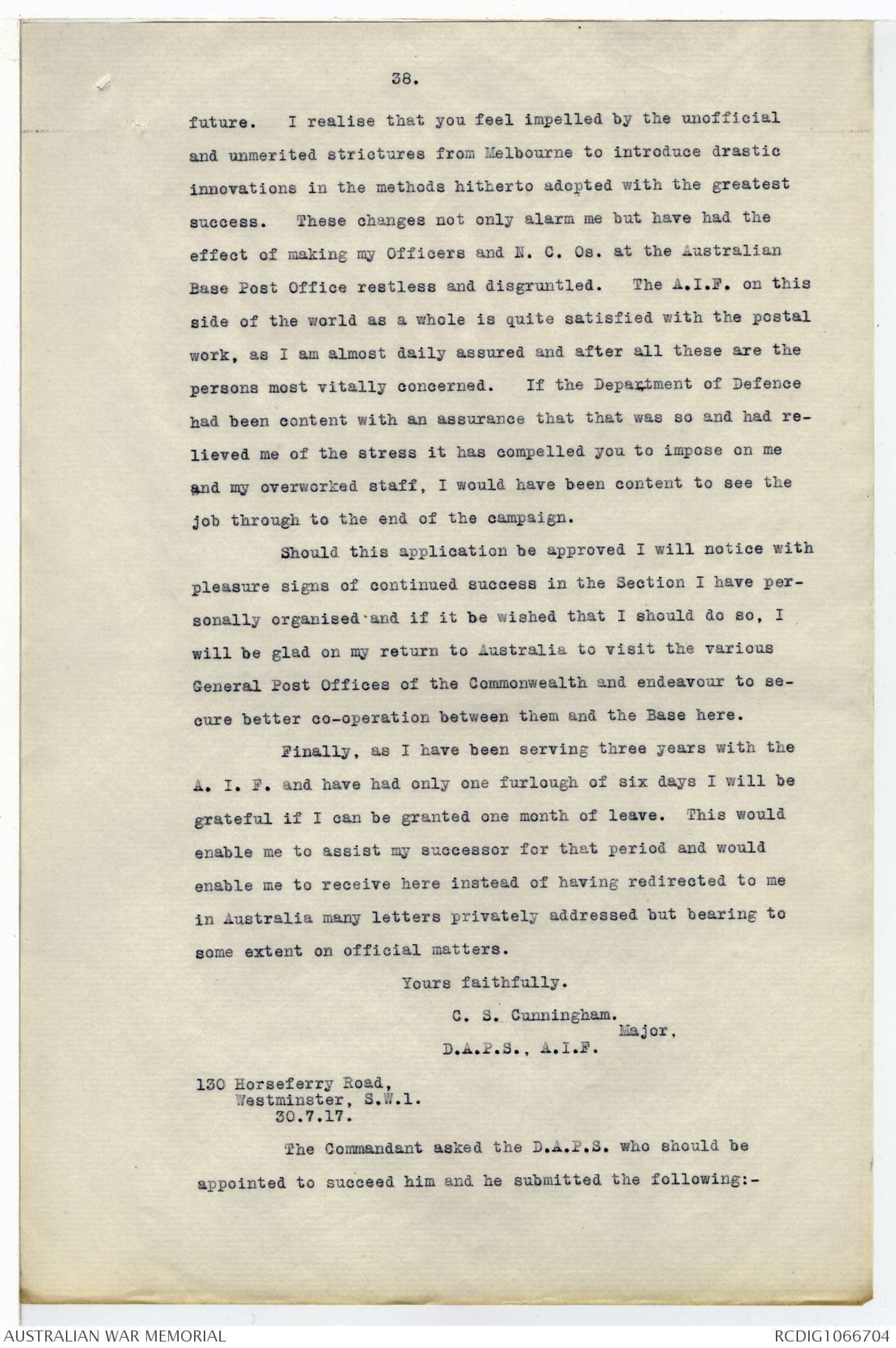
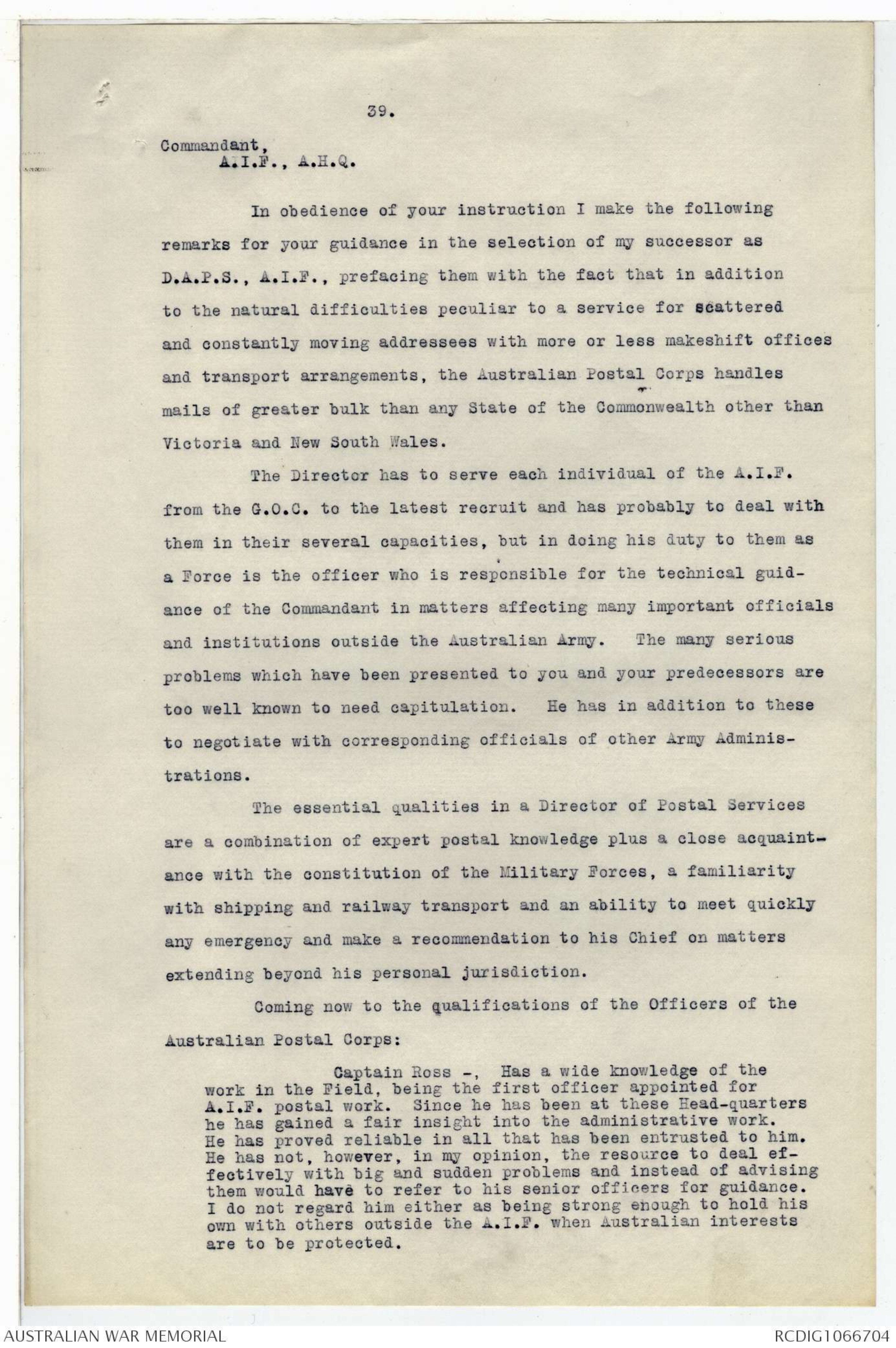
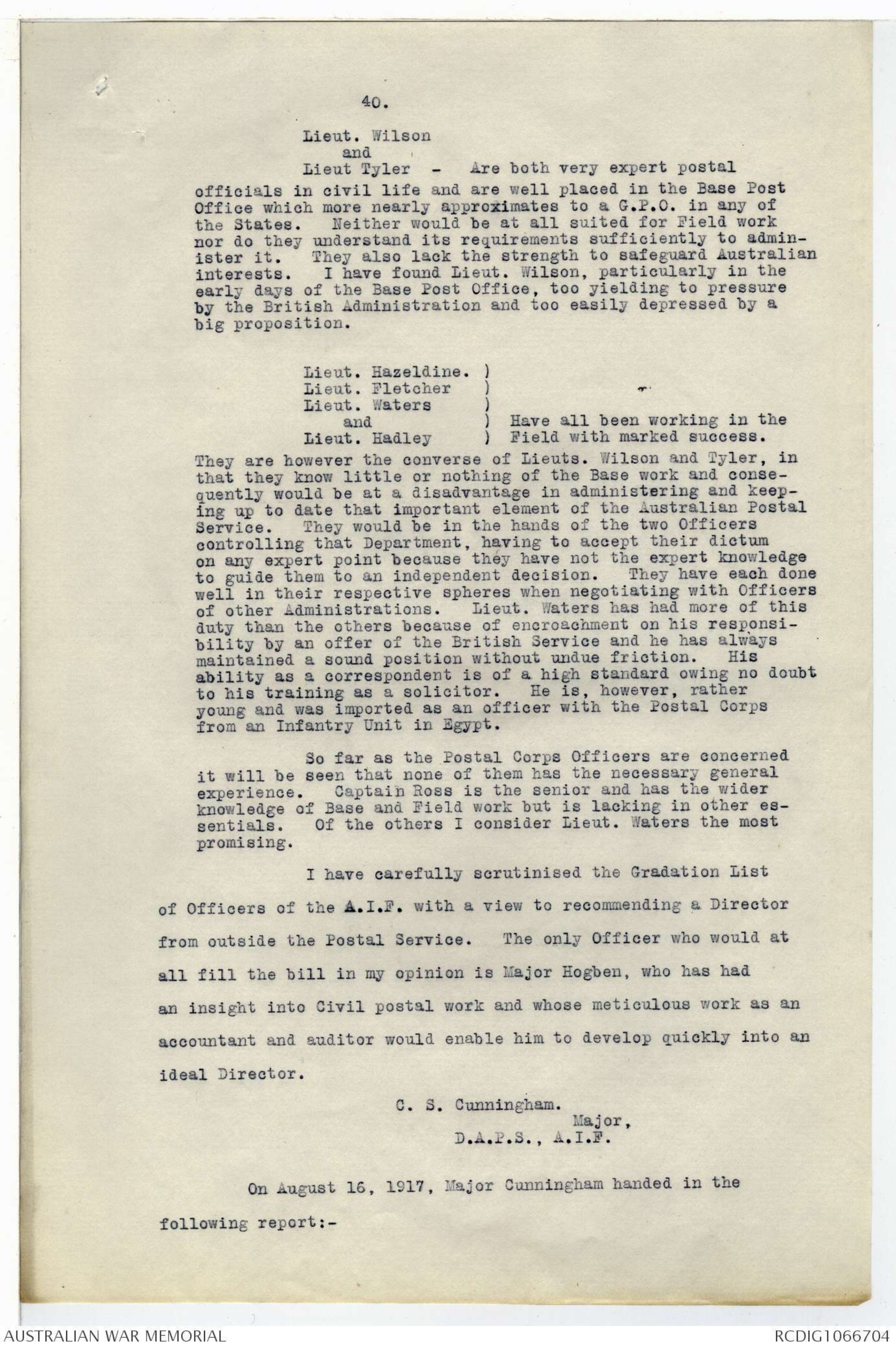
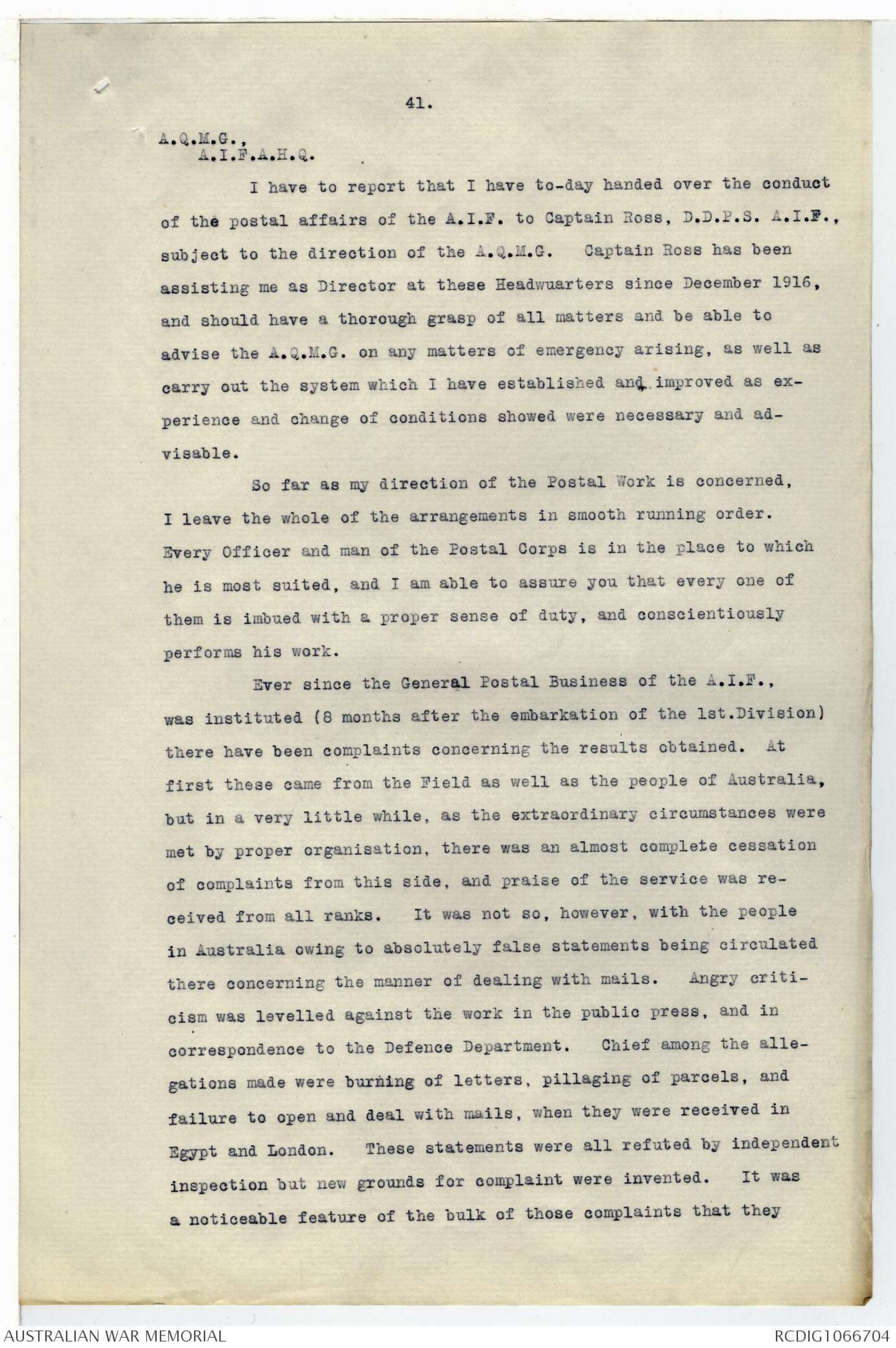
32
Mr. T. Baker (Kodak Ltd) "I quite agree that the
reason men's letters are delayed ^is as a rule their own negligence.
On my last trip there were fewer complaints than in hospitals
I had previously visited".
Lance Corporal A.Q. Sinclair "I must thank you
for the trouble taken on my behalf. For the first two months I
received letters regularly and in addition have received the
overdue ones. I have no doubt my trip to Rouen Hospital caused
most of the trouble, as letters had been twice to the Base before
I received them".
The late Brigadier General Holmes shortly before his
death wrote "Thank you for your letters and the trouble you have
taken re my growl. I realise all the difficulties you have to
contend with and am surprised you are able to do so well. On the
whole the service is excellent and we have a lott to be thankful
for. I congratulate you and those working with you".
No. 2937 Pte. G. Cumming, 8th Battalion "I am
being transferred tomorrow to Harefield Park Hospital xxxxx
I would just like to express my best thanks for the receipt of
all my letters and parcels".
Sergt. Selby "Words cannot express my gratitude to
you for hunting up so many of my missing letters which I am in
receipt of. The trouble was caused through so many changes from
one place to another. I was unable to send my people any definite
address not knowing whether I would return to my original Unit".
C. Payne (Knightsbridge S.W.) wrote - "My nephew has
this week received in No. 5 Hospital Reading three of his missing
parcels from Australia. I am sure he owes them to your kind
enquiries for which we are most grateful".
Captain Walker 17 A.A.S.C. wrote - "From the time of
my notifying you of my whereabouts all letters have arrived safely.
I wish to extend to yourself and staff my sincere gratification for
the prompt and satisfactory manner in which my mail has been
handled".
Alex. Cowan & Sons "We have been extremely indebted
33.
to you for your kindness in helping us to trace men about whom
we have had enquiries from our Australian House".
Lieut. Fielden "The long lost letter has arrived and I
got it safely this morning. For this relief much thanks. I am
very much obliged to you for the trouble you have taken and I
feel like a millionaire".
Bessie (Mrs) Fairbairn interested herself keenly in
many young Australians in both the A.I.F. and B.E.F. making their
troubles her own even to the extent of non-receipt of letters and
parcels. She wrote "I have had letters from a score of boys
telling me they have been getting all my parcels in a batch
and they are glad I had not sent perishable goods. So you see
your trouble over Allan Sowers (B.E.F.) spelled good for hundreds
of others. Now you are at the helm all will be well".
Colonel Hooper "I have already spoken to General
Sellheim on the completeness of your system and on the efficiency
of your staff".
Captain E.M. Connor - "I took a trip out to your
sorting Dept. at Mt. Pleasant and found 2 of my missing letters.
They were addressed as follows :-
"Capt.E.M. Connor
14th Rfts.
25th Bn. 7th Inf. Bde.,
Salisbury Plains,
ENGLAND
I presume the remainder to be addressed in the same way.
Can I again enlist your personal interest? I think that
at least 10 letters are missing, and would be very grateful if you
could unearth them for me.
I am hopeful, for as I told you the other day I have
reason to be more than satisfied with the A.I.F. Postal Dept.
During the Blizzard days at Anzac when shipping was
suspended and afterwards while in different hospitals in Egypt
my mail of course did not reach me, but while back in Australia,
the missing letters numbering well over 100 were all returned to
me.
Again while on Salisbury Plains I received a letter through
your Department which was quite inaccurately addressed.
So now I hope you are going to justify my faith in your
Dept."
The above are picked at random but representing all ranks
in the Service, and are representative of appreciation by civilians.
Reference is also made to letters published in the newspapers
for instance by "Post Here” in The Argus of February 24, 1917;
"Drivers Mother“ The Argus November 9 1916; H.W.L." The Argus
December 7th 1916; "Prahranite" The Argus August 10, 1916;
"Delighted" ditto ditto. Colonel Rhodes ex-Post Master
General of New Zealand interviewed on his return to Australia
said "It will be pleasing to the relatives of troops to know that
in the great majority of cases the charges made against the
administrative bodies ^(postal) were wholly groundless".
CHANGE OF METHODS.
On August 16, 1917 Major Cunningham relinquished the
directorship at his own request and returned to Australia. The
days of stress having passed and the work running smoothly covetous
eyes were cast on the position of Director and a system of pin
pricking began. Among these were visits by officers from
Headquarters to Units of his command without notice to him and
caustic remarks passed to his sub-officers in the presence of the
men of his command tending in his opinion to affect discipline.
His defence of his officers and men resulted in his own disfavour
and he at once requested leave to resign. This was on May lst
1917. The then Commandant prevailed on him to withdraw his
resignation. Colonel Griffiths said his difficulty was to find
someone to take his place and expressed the view that neither
Captain Ross, Lieut. Wilson or Lieut. Tyler would suit. He asked
Major Cunningham's opinion of Lieuts. Fletcher and Hazeldine and
Major Cunningham said he could not recommend them as more fit
than Captain Ross for the position of D.A.P.S. Colonel Griffiths
then said when he found someone to take the position and Major
35
Cunningham was still of the same mind he would allow him to resign.
A month later Major Cunningham again sent in a request for
permission to resign as the official attacks on his command were
continuing, but the Commandant saying he had no one fit to fill
the position declined to pass the resignation to the Commander in
Chief. June 25, 1917 the A.Q.M.G. deputed two junior officers
to report upon the Postal work ostensibly because complaints were
being received from "Defence" Melbourne. The last despatch from
Defence had however been answered in detail by Brigadier General
Sir Robert McC. Anderson and the following acknowledgment had been
received at A.I.F. Headquarters a few weeks before these junior
inspecting officers were appointed:-
DEFENCE
16th March 1917.
MEMORANDUM FOR
The Commandant
A.I.F. Administrative Headquarters,
130 Horseferry Road,
LONDON S.W.
With reference to your despatch No. 80 of the 11th January
respecting the work of the Australian Army Postal Corps, I am
directed to inform you that the Minister most highly appreciates
your report on the proficiency of the Australian Postal Corps,
and fully recognises the tremendous difficulties under which the
postal services are carried out.
I am to add that a statement has been given to the press showing
the activities of that Corps.
T. H. TRUMBLE
A/Secretary.
With full knowledge of these despatches Major Cunningham realised
that an attempt was being made to secure the directorship for one of
those deputed to report though that officer was ignorant of the
simplest elements of postal work. He protested against the appointment
which was made in the following terms:-
36
25th June, 1917.
Captn Sherrington.
For some months past an opinion has become prevalent
in Australia that there is something wrong with our postal
methods. We have had them reported upon by Members of the
British Postal service, and the Post Office has been visited by
prominent Australians who happened to be in London. These reports
and our comments have been passed on to the Department of Defence,
but there is evidently still lurking in the Minister's mind a
suspicion that all is not as it should be,
The D.A.P.S. is a zealous officer, and from a cursory
examination of the system it appears to be quite satisfactory
but it will be an advantage to the D.A.P.S., as well as to the
Commandant here, and the Minister for Defence in Australia, to
get a detailed report with recommendations as to improvement, if
such can be found.
The Post Office, of course, will always be a target for
criticism, because it is so often used as a cloak for laziness
on the part of soldiers who have not written to their relatives
and friends, and who find it convenient to blame the postal people.
You are given full powers to investigate the whole service,
and to interrogate any of the personnel, so that your investigation
might be complete. You will use your own discretion as to how
far to go, but it is suggested that you should concentrate your
efforts on what appears to be the weakest line - redirection.
The Commandant places so much stress on having the postal
work efficient, that he has decided to associate with you in
your investigations, Captain Campbell Carmichael - his Staff
Captain - and you will please confer and co-operate with him
in your efforts. It is hoped that you will be able to let us
have your joint report and recommendations with as little delay
as possible.
H.J. WRIGHT
A.Q.M.G.
37
Neither of these officers had qualifications for the
duty assigned to them and their appointment really meant a sitting
in judgment on the high British officials who had already given
a report on the subject of redirection. It will be noted that
the appointing letter concludes "It is hoped that you will be able
to let us have your joint report and recommendations with as
little delay as possible", language which savours more of the hat
and bandbox trade than the Army. However Captain Carmichael did
report independently of his colleague and promptly. Not so Captain
Sherrington who has probably never to this day sent in any report.
What he did was to proceed to Regents Park Parcels P.O. and give
directions for large structural alterations. This brought him
into conflict with Colonel Wheeler R.E. who informed Major
Cunningham. The last named officer declined to retain responsibility
while an outsider was permitted to interfere but secured no relief
from Headquarters. He then sent in his resignation for the third
time in the following terms -
The Commandant
A.I.F. A.H.Q.
I regret having again to submit an application that I
be permitted to return to Australia to resign my Commission
but I do so for the reason stated in my original application
of May 1 attached.
C.S. CUNNINGHAM
Major
Director Army Postal Services, A.I.F.
130 Horseferry Road,
Westminster S.W. 1
30.7.17.
This was accompanied by the following letter:-
Dear Colonel Griffiths,
Regarding the attached application for leave to return to
Australia to resign my Commission, the postal work of the A.I.F.
in a greater degree than that of any other Force provides its
own difficulties and anxieties, but when these are added to by
constant, and I submit, unnecessary complaints and criticism
from Australia I confess that I foresee less efficiency in the
38
future. I realise that you feel impelled by the unofficial
and unmerited strictures from Melbourne to introduce drastic
innovations in the methods hitherto adopted with the greatest
success. These changes not only alarm me but have had the
effect of making my Officers and N. C. Os. at the Australian
Base Post Office restless and disgruntled. The A.I.F. on this
side of the world as a whole is quite satisfied with the postal
work, as I am almost daily assured and after all these are the
persons most vitally concerned. If the Department of Defence
had been content with an assurance that that was so and had
relieved me of the stress it has compelled you to impose on me
and my overworked staff, I would have been content to see the
job through to the end of the campaign.
Should this application be approved I will notice with
pleasure signs of continued success in the Section I have
personally organised and if it be wished that I should do so, I
will be glad on my return to Australia to visit the various
General Post Offices of the Commonwealth and endeavour to
secure better co-operation between them and the Base here.
Finally, as I have been serving three years with the
A. I. F. and have had only one furlough of six days I will be
grateful if I can be granted one month of leave. This would
enable me to assist my successor for that period and would
enable me to receive here instead of having redirected to me
in Australia many letters privately addressed but bearing to
some extent on official matters.
Yours faithfully.
C. S. Cunningham.
Major,
D.A.P.S., A.I.F.
130 Horseferry Road,
Westminster, S.W.1.
30.7.17.
The Commandant asked the D.A.P.S. who should be
appointed to succeed him and he submitted the following:-
39
Commandant
A.I.F., A.H.Q.
In obedience of your instruction I make the following
remarks for your guidance in the selection of my successor as
D.A.P.S., A.I.F., prefacing them with the fact that in addition
to the natural difficulties peculiar to a service for scattered
and constantly moving addressees with more or less makeshift offices
and transport arrangements, the Australian Postal Corps handles
mails of greater bulk than any State of the Commonwealth other than
Victoria and New South Wales.
The Director has to serve each individual of the A.I.F.
from the G.O.C. to the latest recruit and has probably to deal with
them in their several capacities, but in doing his duty to them as
a Force is the officer who is responsible for the technical guidance
of the Commandant in matters affecting many important officials
and institutions outside the Australian Army. The many serious
problems which have been presented to you and your predecessors are
too well known to need capitulation. He has in addition to these
to negotiate with corresponding officials of other Army Administrations.
The essential qualities in a Director of Postal Services
are a combination of expert postal knowledge plus a close acquaintance
with the constitution of the Military Forces, a familiarity
with shipping and railway transport and an ability to meet quickly
any emergency and make a recommendation to his Chief on matters
extending beyond his personal jurisdiction.
Coming now to the qualifications of the Officers of the
Australian Postal Corps:
Captain Ross -, Has a wide knowledge of the
work in the Field, being the first officer appointed for
A.I.F. postal work. Since he has been at these Head-quarters
he has gained a fair insight into the administrative work.
He has proved reliable in all that has been entrusted to him.
He has not, however, in my opinion, the resource to deal
effectively with big and sudden problems and instead of advising
them would havé to refer to his senior officers for guidance.
I do not regard him either as being strong enough to hold his
own with others outside the A.I.F. when Australian interests
are to be protected.
40
Lieut. Wilson
and
Lieut Tyler - Are both very expert postal
officials in civil life and are well placed in the Base Post
Office which more nearly approximates to a G.P.O. in any of
the States. Neither would be at all suited for Field work
nor do they understand its requirements sufficiently to administer
it. They also lack the strength to safeguard Australian
interests. I have found Lieut. Wilson, particularly in the
early days of the Base Post Office, too yielding to pressure
by the British Administration and too easily depressed by a
big proposition.
Lieut. Hazeldine. )
Lieut. Fletcher )
Lieut. Waters )
and ) Have all been working in the
Lieut. Hadley ) Field with marked success.
They are however the converse of Lieuts. Wilson and Tyler, in
that they know little or nothing of the Base work and consequently
would be at a disadvantage in administering and keeping
up to date that important element of the Australian Postal
Service. They would be in the hands of the two Officers
controlling that Department, having to accept their dictum
on any expert point because they have not the expert knowledge
to guide them to an independent decision. They have each done
well in their respective spheres when negotiating with Officers
of other Administrations. Lieut. Waters has had more of this
duty than the others because of encroachment on his responsibility
by an offer of the British Service and he has always
maintained a sound position without undue friction. His
ability as a correspondent is of a high standard owing no doubt
to his training as a solicitor. He is, however, rather
young and was imported as an officer with the Postal Corps
from an Infantry Unit in Egypt.
So far as the Postal Corps Officers are concerned
it will be seen that none of them has the necessary general
experience. Captain Ross is the senior and has the wider
knowledge of Base and Field work but is lacking in other essentials. Of the others I consider Lieut. Waters the most
promising.
I have carefully scrutinised the Gradation List
of Officers of the A.I.F. with a view to recommending a Director
from outside the Postal Service. The only Officer who would at
all fill the bill in my opinion is Major Hogben, who has had
an insight into Civil postal work and whose meticulous work as an
accountant and auditor would enable him to develop quickly into an
ideal Director.
C. S. Cunningham.
Major,
D.A.P.S., A.I.F.
On August 16, 1917, Major Cunningham handed in the
following report:-
41
A.Q.M.G.
A.I.F.A.H.Q.
I have to report that I have to-day handed over the conduct
of the postal affairs of the A.I.F. to Captain Ross, D.D.P.S. A.I.F.,
subject to the direction of the A.Q.M.G. Captain Ross has been
assisting me as Director at these Headquarters since December 1916,
and should have a thorough grasp of all matters and be able to
advise the A.Q.M.G. on any matters of emergency arising, as well as
carry out the system which I have established and improved as experience
and change of conditions showed were necessary and advisable.
So far as my direction of the Postal Work is concerned,
I leave the whole of the arrangements in smooth running order.
Every Officer and man of the Postal Corps is in the place to which
he is most suited, and I am able to assure you that every one of
them is imbued with a proper sense of duty, and conscientiously
performs his work.
Ever since the General Postal Business of the A.I.F.,
was instituted (8 months after the embarkation of the lst.Division)
there have been complaints concerning the results obtained. At
first these came from the Field as well as the people of Australia,
but in a very little while, as the extraordinary circumstances were
met by proper organisation, there was an almost complete cessation
of complaints from this side, and praise of the service was
received from all ranks. It was not so, however, with the people
in Australia owing to absolutely false statements being circulated
there concerning the manner of dealing with mails. Angry criticism
was levelled against the work in the public press, and in
correspondence to the Defence Department. Chief among the allegations
made were burning of letters, pillaging of parcels, and
failure to open and deal with mails, when they were received in
Egypt and London. These statements were all refuted by independent
inspection but new grounds for complaint were invented. It was
a noticeable feature of the bulk of those complaints that they
 Sam scott
Sam scottThis transcription item is now locked to you for editing. To release the lock either Save your changes or Cancel.
This lock will be automatically released after 60 minutes of inactivity.